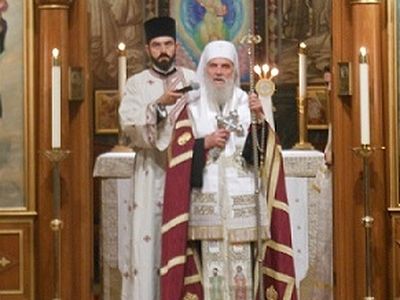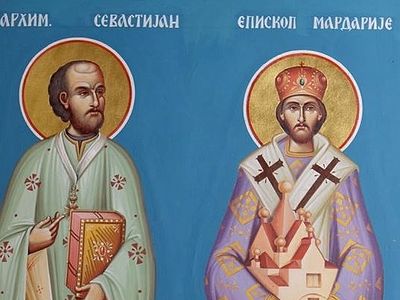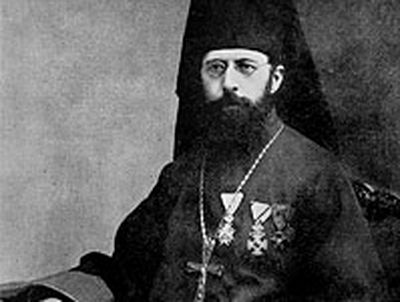Alhambra, California, Sept. 7, 2015
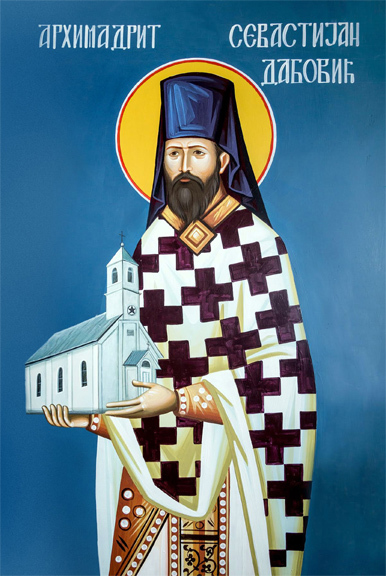
The festivities of the Diocesan Days gathering of the Western American Diocese of the Serbian Orthodox Church in North and South America continued on Saturday with the celebration of the festal Matins and Divine Liturgy for the canonization of the Serbian-American missionary saint Sebastian Dabovich. His Grace Maxim and his clergy and people were joined by Orthodox clergy and faithful of the area and from all over America and beyond. Amongst the visiting hierarchs the jurisdictions of the Greek, Russian (both Moscow Patriarchal and ROCOR), Georgian, Bulgarian, and American (OCA) Orthodox Churches were represented.
At the end of Matins all greeted His Holiness Patriarch Irinej as he entered into St. Stephen’s cathedral and the clergy processed to the front of the church led by the icon of St. Sebastian. The official proclamation of canonization of St. Sebastian was read by His Grace Bishop Longin of New Gracanica and Midwestern America. Exhorting the Orthodox faithful, His Grace read:
Proclaiming him a holy, Christ-bearing God-pleaser of the Orthodox Church, we pray to the Lord that his witness of the Only Lover of man, and his living examples of faith and love be an invitation to us all that we follow and glorify him in Christ's Church in the divine services and through hymns of praise. This glorification bestows upon God's Church a great spiritual joy and thanksgiving to the Living Lord.
The full text of the proclamation and a summary of the entire day can be read on the website of the Serbian Orthodox Church.
The homily in the Divine Liturgy was offered by His Grace Archbishop Demetrios (GOA) in which he highlighted the humility of St. Sebastian and enumerated his qualities which made him a truly apostolic missionary in America:
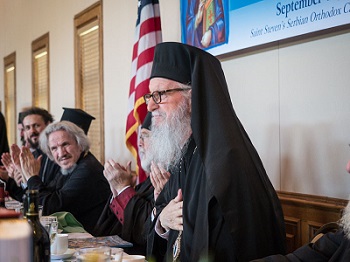 Photo: www.spc.rs
Photo: www.spc.rs St. Sebastian was a humble, meek, peaceful, serene, but dynamic kind of person. And he exhibited in his life the very, among other, three basic characteristics of a saint and truly apostolic person. First, a total dedication to God. We believe in God. God is part of our life. The question is “is God our absolute priority?” “What are our priorities?” For St. Sebastian the priority in the absolute sense was God—total absolute unending, non-discussable when it came to God. And this is why he was able also to connect the people with him and with God, because he was really exhibiting this deep faith in total dedication to Him and making God the priority.
And Second, St. Sebastian exhibited another characteristic of a saint and apostle—the passion for promoting the Gospel. He was very faithful to what the Lord said before His Ascension: Go and make disciples of all nations, teaching them to follow what I committed to you, baptizing them in the name of the Father and of the Son and of the Holy Spirit, and I am with you unto the end of the ages. This is at the end of the Gospel of Matthew, but we have at the beginning of the book of Acts a similar version of the same commandment when the Lord said You will receive the Holy Spirit and you will be my witnesses in Jerusalem and Samaria and Judea and to the ends of the earth. So this is our tremendous commission and St. Sebastian was a priest who really took this commandment to heart, that he had to work day and night for the promotion of the Gospel that saves, for the love of Christ Jesus the Lord and Savior, and for the correction of the people with the holy Orthodox Church—an uninterrupted continuation of the original Church created by Jesus Christ Himself. So here we have someone who was working day and night and promoting and spreading and sharing the Gospel with the people.
But there is a third characteristic—not only the absolute priority of God, not only the passionate, methodical, unending promotion of the Gospel—the third characteristic is the very love, the very care for the people that were entrusted to him as a priest. Here St. Sebastian applied in a way what St. Paul said to one of his beloved communities, Who is sick and I am not sick? Who is scandalized and I am not in fire? And he added in another instance, Remember that I have been teaching you, admonishing you, comforting you with plenty of tears—not in a dry, long distance way but with tears, taking care of every one of the people. At the end of his major letters there is a long list mentioning people, one by one, and always blessing them, which shows this tremendous pastoral dimension of Paul the great Apostle.
St. Sebastian was a pastor, a caring person. He was not someone sending adulation, and he was not someone just offering fancy theology—he was someone caring for the people with whom he shared the Gospel with the passion for absolute love for God. Today it is a great occasion that we are in this Divine Liturgy. We see his icon, we chanted his apolytikion, and we are liturgizing with the sense of his saintly presence. Our time needs people of complete dedication to God, of passion for the promotion for His holy Gospel, and for a heart that is beating with unlimited love and care for the people, promoting ultimately this kind of holiness and sanctity which is so necessary today in our suffering, corrupted, confused, disoriented society and world of ours. We desperately need the saints of the kind of St. Sebastian and we are glad and blessed and privileged to be here in this Liturgy where we have the most vivid impression of his splendid and brilliant holiness and dedication to God.
May the Lord of the saints, through the prayers and intercessions of the new St. Sebastian of San Francisco and Jackson be always with us, especially with this publication that is the honor of being part of this first Liturgy after the declaration of holiness of St. Sebastian. Thank you Your Beatitude for giving me the opportunity of offering these humble words on this very great day.
Following the Liturgy, which was antiphonally sung by seminarians of the Prizren diocese in Serbia and a choir consisting of singers from throughout the Western American diocese, His Holiness again addressed the people concerning the newly glorified St. Sebastian, recounting his endless zeal and energy for bringing the Gospel of Jesus Christ throughout the entirety of America:
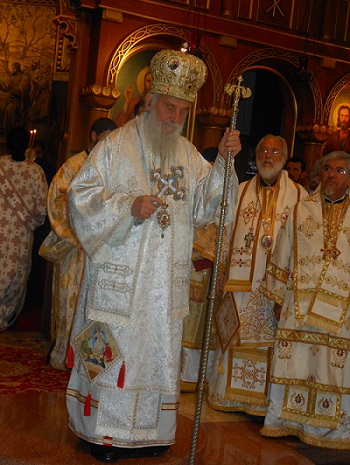
Who is this St. Sebastian? He is a Serbian child, dear brothers and sisters. He was of devout Serbian parents born here in this country—the first to be born in America and ordained to the holy priesthood. And we heard this morning at the Liturgy about the holiness of the life of St. Sebastian from the inspirational message of Abp. Demetrios and I will not add to that beautiful message other than to underscore that he was a true apostle which means a true missionary of the Gospel of Jesus Christ. As a young child born here in San Francisco he learned first about the commandments and the way of the Gospel and the Orthodox faith and later completed his theological studies in Russia where he learned all of the necessary lessons of faith for ordination to the priesthood. It was there while in Russia that he encountered holy people in history as well as his contemporaries and he sensed that fullness of life and learning from their examples he was a wonderful follower of their examples of holiness.
Having completed his studies in Russia he returned to San Francisco. As a young man he had a great desire to walk the path of St. Sava and all the holy ones of God. That’s why very early upon his return to San Francisco he was tonsured into the monastic ranks and ordained into the holy priesthood in order to best serve God and His people. He loved the Serbian people and whenever he knew of their gathering he would hurry quickly to visit them and bring to them the good news of the Gospel and teach them the faith of the Fathers. There isn’t a place on this continent where he didn’t go where there was a gathering of Serbian people, regardless of their numbers great or small. He taught and established the community of faith in those areas and built churches and taught them to serve the Lord. He was their greatest teacher. Like the Apostle Paul he was able to cite the words “Follow my example as I follow the example of all the holy ones before us.”
Of course he loved his own people, the Serbs, Russians, Greeks, Antiochians, Syrians, and all the rest of the Orthodox peoples but he also loved all people and was willing to serve them to bring them the Orthodox faith, and wherever he found a soul thirsting for God he would sow that word of God in their hearts in order to bring them to the truth. And in our recent history there was no one who traveled more to do this than St. Sebastian. He traveled through Russia and all the way to Alaska to serve the Lord, and then even to Japan to do the same work in the vineyard. His contemporary, the great St. Nicholai was in awe of his travels, and all that he did to be a great missionary and servant of the Lord. He loved his own Orthodox people but he loved everyone and he was able to see in every human being that image of God as God created them to be and to honor that image as he met them and sowed the seeds of faith in their lives. And only God knows in fact how great was his effort and work and his ascetic labors in completing the work that God gave him to do in establishing all these souls.
The last two years of his life by Divine providence he spent at the most historic place of our people—the monastery Zicha, and he reposed there. While he was on his sickbed in Zicha the great St. Nicholai was able to visit him and he asked if there was anything he needed and holy father Sebastian replied as a sick, elderly man, simply “Your Grace, all I need is the kingdom of God, nothing less and nothing more.” He reposed in Zicha and unfortunately after his repose Serbia and Yugoslavia suffered greatly under historical circumstances of war and the monastery barely survived. Bp. Nicholai himself suffered as we know. He lost his freedom and ended up in the Dachau concentration camp. Because of the circumstances of war the monastery itself suffered destruction and the monastics had to find shelter elsewhere and so the grave of Fr. Sebastian was left without care.
Unfortunately what follows is more misfortune with the German occupation and then the occupation of Communism when it was not permissible to speak about saints and holiness in the Church. The result of that is that after time even the grave of Fr. Sebastian was neglected and unrecognizable. As the Lord Himself said A city cannot be hid when it stands upon a hill. But the life and work of St. Sebastian by God’s desire was not to be left unrecognized but in fact to be acknowledged by us and the whole world.
And so God revealed the great holiness and missionary work of Fr. Sebastian which we now honor. And God revealed his grave and we have brought his relics back now to his birthplace of northern California and those relics are before us today. And I believe that in this way the Lord fulfilled St. Sebastian’s desire to have his earthly remains in the place that he was born. The translation of his relics to northern California was very significant for the people here because in the consciousness of the people here his holiness was already recognized. His relics will be placed in the parish in Jackson which he established and founded—the first Serbian Orthodox church in America.
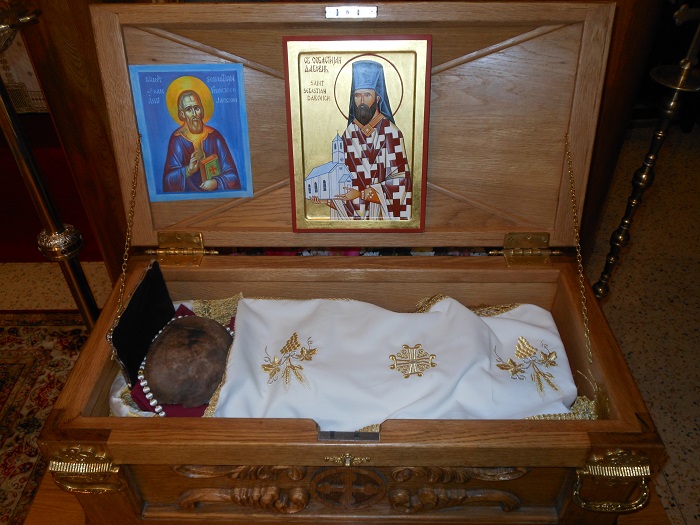 Relics of St. Sebastian
Relics of St. Sebastian Dear brothers and sisters this is indeed a great day of joy for everyone because through the Church God has placed Fr. Sebastian in the ranks of the synaxis of saints and therefore it is a joy for all people of good will because the saints are not just for us to honor but all people can find that which is honorable in them. Thanks be to God that we have now yet another saint from this land and an intercessor from our time. By God’s grace St. Sebastian will always be among the people whom he served and loved and every sincere prayer that any of us offer to God through him will be heard by our Lord Who will grant the request of His holy one as an intercessor. Let us pray with gratitude that God will accept his prayers on our behalf for all Orthodox people and grant them all which is good and useful for salvation.
And let us offer prayers to him on behalf of all the suffering Serbian people, particularly those in the region of Kosovo and Metohija who are suffering so much to preserve the faith. And let us also offer prayers to him that he will be the intercessor and protector of his own devout people in Montenegro where they are struggling to keep the faith in an environment of schism where unworthy ones are trying to influence the life of the Church and take away the experience of true faith from the people of God. Let us pray to our new intercessor, let us take his hand and follow his path as he is an example for all of us of true faith and service to the Lord and His Church. My prayer is that God will hear the prayers of His saints and that each one of us will pray to him as our intercessor to remain on the true path of faith and love for God and His Kingdom. Amen.
The day continued with a celebratory meal and symposium in which several speakers addressed specific themes concerning the canonization of St. Sebastian, including the process of canonization, the painting of the new icons of Sts. Sebastian and Mardarije, and his asceticism of peace within a busy city. Resurrection Vespers was served in the evening followed by dinner and an evening of celebration of Serbian culture, including several musical and dance performances and the annual oratorical festival. The evening was capped with the magnificent performance by Serbian composer and singer Slobodan Trkulja.



